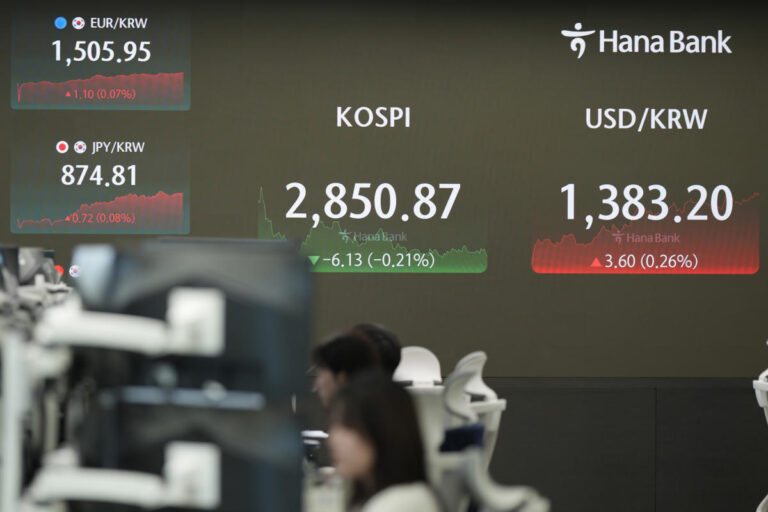Asian stocks opened mixed this week after China said its economy grew at a weaker-than-expected annual rate of 4.7 percent last quarter.
Markets appear to be calmly responding to the shooting at a rally for former President Donald Trump in Butler, Pennsylvania, which is being investigated as an attempted assassination of the Republican front-runner.
Futures for the S&P 500 rose 0.3%, while the Dow Jones Industrial Average added 0.2%.
China’s Communist Party leaders are meeting for four days in Beijing to map out an economic strategy for the next decade, and investors are watching for signs of measures to help a struggling property market recover and local governments tackle high debt loads.
While annual economic growth slowed from 5.3% in the first quarter, the 5% expansion in the first half of the year was in line with the government’s forecast of growth of about 5% in 2024. On a quarterly basis, the economy expanded 0.7%.
“The set of economic data released by China this morning was not encouraging ahead of the upcoming Central Committee plenary session, with the data again suggesting mixed results for the world’s second-largest economy,” IG’s Yep Jun Rong said in a commentary.
Hong Kong’s Hang Seng Index fell 1.5% to 18,021.73 early Monday on heavy selling by property developers, while the Shanghai Composite Index was down less than 0.1% to 2,970.77.
As expected, the central bank left its medium-term lending rate unchanged at 2.5 percent. This is the rate at which Chinese banks borrow from the central bank for six months to a year, and indirectly influences other benchmark interest rates that affect interest rates on mortgages and other loans.
Tokyo markets were closed for a public holiday.
In Seoul, the KOSPI rose 0.1% to 2,860.92 and the S&P/ASX 200 added 0.7% to 8,017.60. Taiwan’s Taiex lost 0.2% and Bangkok’s SET lost 0.7%.
U.S. stocks rose on Wall Street on Friday as mixed signals on big bank profits and inflation did little to dent Wall Street’s view that interest rates will be cut.
The S&P 500 rose 0.6%, its fifth consecutive gain in the past six weeks, to finish at 5,615.35. The Dow rose 0.6%, to 40,000.90, and the Nasdaq Composite rose 0.6%, to 18,398.45. All three indexes were on track to hit new all-time highs in afternoon trading but finished just short.
The Russell 2000 rose 1.1%, nearly double the gain of the S&P 500, finishing with its strongest week in eight months.
Bank of New York Mellon Co. rose 5.2%, the market’s biggest gainer, after it reported spring profits that beat analysts’ expectations. Nvidia Inc. and other highly influential Big Tech stocks also helped lift the market from a day earlier’s losses that had halted a sharp rise amid enthusiasm over artificial intelligence technology.
The latest release on U.S. inflation showed wholesale prices rose more than economists expected last month, but Thursday’s data showed consumer-level inflation rose faster than expected, a disappointment.
The softening of those expectations marks a second straight month, helping ease concerns about a potential vicious cycle in which expectations of higher inflation spur U.S. consumers to take actions that push up inflation even higher. That could give the Fed more evidence of slowing inflation it says it needs to start cutting its key interest rate, which is at its highest in more than two decades.
Traders see a 94% chance that the Federal Reserve will begin easing interest rates in September, according to data from CME Group. Lower rates would ease pressure that has built up in the economy from people getting more expensive to borrow on credit cards to buy homes, cars and everything else. Fed officials have said they want to see “better data” on inflation before acting.
Benchmark U.S. crude oil fell 3 cents to $82.18 a barrel in electronic trading on the New York Mercantile Exchange early Monday.
Brent crude, the international standard, fell 10 cents to $84.93 a barrel.
The U.S. dollar fell to 158.14 yen from Friday’s close of 158.16 yen. The euro fell to $1.0889 from $1.0894.

